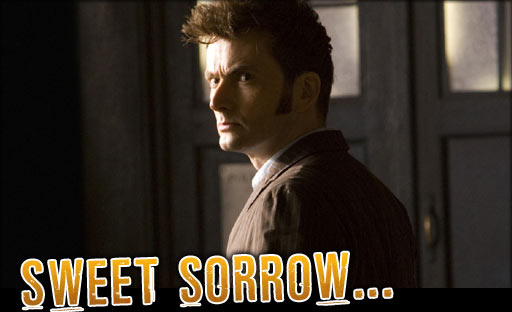
Aired 01 January 2010
The first half of this epic two-part story spent a lot of time moving pieces about and setting up the board, and it’s up to ‘The End of Time Part Two’ to satisfactorily resolve those events while providing a worthy send-off for the David Tennant and Russell T Davies era as the Tenth Doctor must finally meet the fate he has been trying to hard to avoid.
Beginning with the end, this is easily the most emotional regeneration sequence depicted so far. While it is never pleasant or easy to say goodbye to a lead, this is the first time that so much screen time has been devoted to the Doctor accepting and confronting the ramifications of his looming demise; these scenes are easily some of the strongest of the serial, allowing Tennant to explore a greater sense of melancholy than he is usually allowed. With this added time, the Doctor is also able to claim what he deems his reward- one final visit to several former companions, including a scene with Rose before she had ever met him. While undoubtedly a bit of ultimately unnecessary fan service, it does serve as a superbly remind the audience and the Doctor of everything he has been through over the previous years.
As powerful as Tennant’s performance is as he begrudgingly accepts his fate, though, the ultimate reveal of the four knocks as the portent of his demise offers one of the most heartbreaking and emotional scenes in the long history of Doctor Who. The entirety of the story sees the Tenth Doctor being emotionally torn apart as he continued to overcome the odds to prove victorious, but it isn’t after impassioned tears start flowing and he believes he has beaten destiny that the camera reveals Wilf, trapped in a radiation chamber, knocking four times. After such amazing action and set pieces, it’s a brilliant piece of writing that allows such a simple scene to carry so much weight. Bernard Cribbins again delivers a standout performance, brilliantly underplaying the danger and showing the gentle resolve and love that makes his character so enduring.
As strong as those last minutes of the episode are, however, the events leading up to them are fairly strong as well. Wisely, the Master’s mania is substantially tempered, allowing John Simm to play a slightly more grounded version that again seems a worthy adversary for the Doctor as bigger events unfold around them. The Time Lords have returned, headed by Timothy Dalton’s magnificent Rassilon, and it speaks to his sheer power that he can instantly undo the villainous plan that had taken the Master all of ‘Part One’ to put in motion. It truly is mesmerising to see just how ruthless and dangerous the Time Lords have become due the Time War, a far cry from their portrayal in the classic series and adding even more weight to his already tortured soul. It does seems like a missed opportunity that there isn’t any further exploration of how they (and Gallifrey as a whole) did ultimately reach this point, but the effect is just as moving nonetheless. The revelation that the heartbeat of a Time Lord mimics the four knocks is perhaps a little too on the nose and the ability of White Point Star to break the Time Lock is just a bit too convenient, but both do serve as neat continuity nods to the Master and his journey.
The scene with the Doctor standing in between the Master and Rassilon is yet another momentous scene in an episode packed with them, the struggle as he tries to decide the bigger of the evils all too apparent in his weary eyes. While usually the concept of the Doctor firing a weapon would be completely out of character, there is a genuine sense that this is a man beyond normal boundaries, and the angst and ultimate payoff are both immensely satisfying.
One of the big issues with Russell T Davies’s era as showrunner is that oftentimes the second halves of his two-parters fail to live up to the immensity of the first halves. Fortunately, that is far from the case here as ‘The End of Time Part Two’ far surpasses its lead-in in every sense. While it is a shame that the Donna’s role was quite inconsequential after such buildup- the power of remembering simply allowing her to escape the Master- and that the Time Lords and Gallifrey could not be further explored, the overall plot and pacing were fantastic, aided yet again by another masterful score. It’s not a perfect episode but it delivers emotion in abundance, both in big scenes and small scenes alike, allowing David Tennant a brilliant final outing as the Tenth Doctor as he finally meets his destiny, accepting both his attributes and flaws. He doesn’t have the best final words, but they surely echo the feelings of the vast majority of fans out there, and the explosive regeneration emphatically says goodbye to both the lead actor and the showrunner who has made the show so successful once more.


November 28, 2020
[…] II; Zygon Reviews I & II; Junkyard View; Lyratek; Random Whoness; Doctor Who Reviews I & II; Who In […]